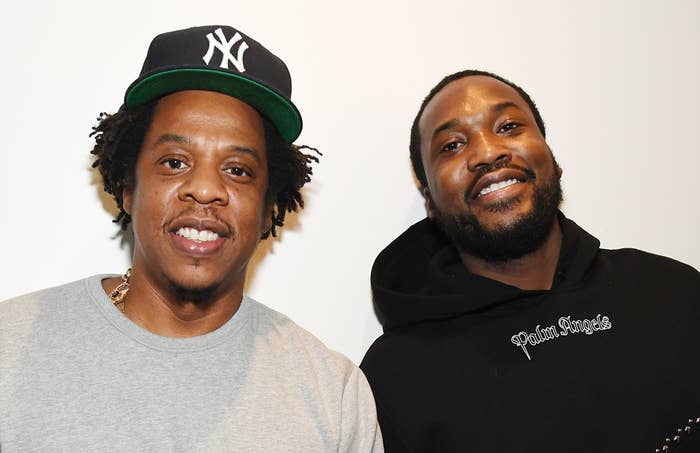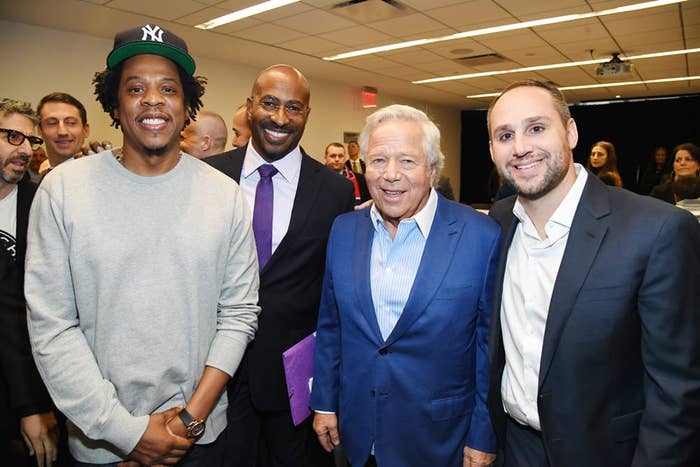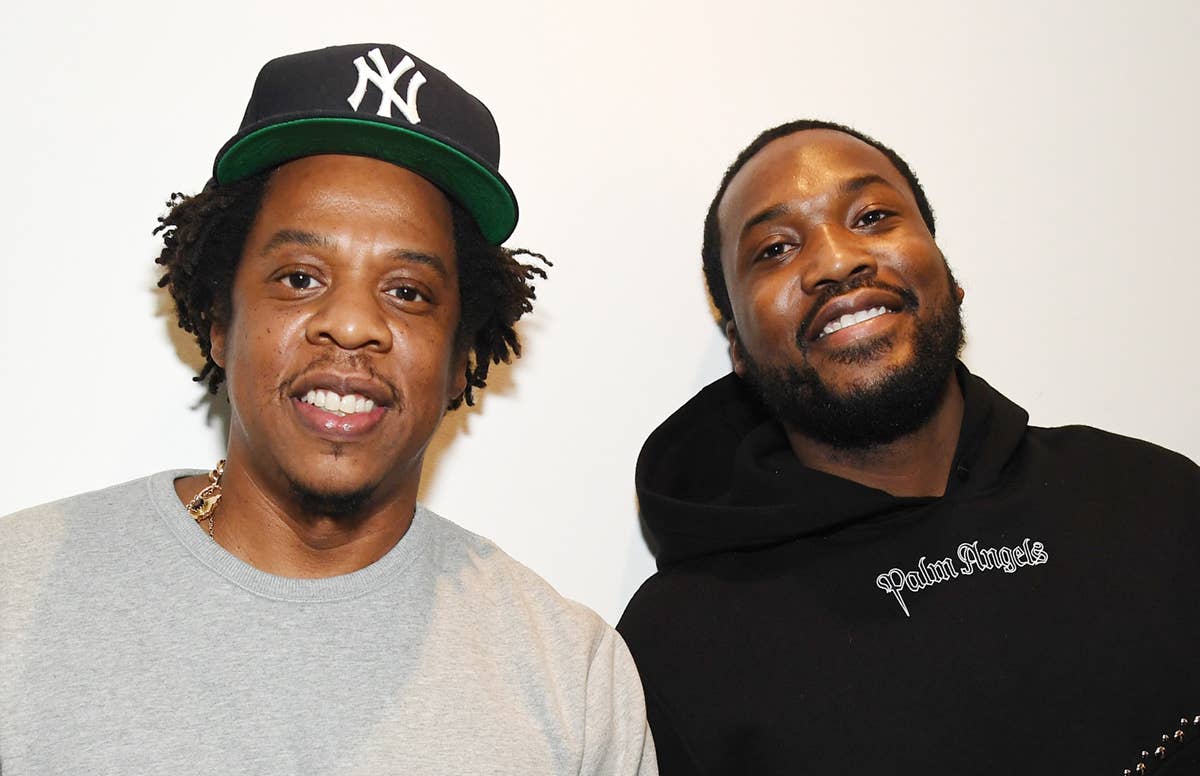
Last month, JAY-Z and Meek Mill announced the launch of a new criminal justice reform organization called REFORM Alliance. The organization, inspired by Meek’s ongoing battles with the law, would focus on reforming parole and probation policies. The two rappers were among the new group’s founding partners. Also on that list were a group of billionaires: 76ers owner Michael Rubin, Patriots owner Robert Kraft, Nets co-owner Clara Wu Tsai, hedge fund manager and investor Daniel Loeb, cryptocurrency titan Michael Novogratz, and Vista Equity Partners founder Robert Smith. With people like that on board, it was no surprise that REFORM Alliance began with $50 million in funding.
Van Jones is steering the ship. The longtime activist has been working on criminal justice issues since the mid-1990s. In the years since, he has founded and run multiple organizations, started his own show on CNN, and even worked for a while in the Obama administration as an adviser on green jobs, climate and energy initiatives. His latest job is REFORM Alliance CEO. I called him up to hear what he wants to accomplish at his new gig. Our conversation has been lightly edited for clarity and length.

What new laws are you aiming to get on the books, and which existing laws are you trying to change?
Our focus is, of course, on probation and parole of the about six million people who are under the control of the criminal justice system. A little bit more than two million are locked up in jails and prisons, but a little bit more than four million are caught up on probation and parole.
What we want to do is focus on very simple things that you probably think are already in place—I certainly thought they were already in place. For instance, a cap on how long you can be on probation. In some states there's no cap. They can keep adding to your probation, just like Meek Mill. You could do something that gets you a charge, and then you can be, essentially, not free for the rest of your life because you're late for a meeting—15 minutes late, they add a year on probation. Your aunt has an asthma attack in the next neighborhood over and you go over to help her, you've violated and they add five years onto your probation. Putting a cap on probation and parole is something that we're passionate about.
The other thing we're passionate about is moving away from sticks and toward carrots. Right now, to try to keep people on the straight and narrow when they're on probation or parole, if you do something bad, they’re going to hurt you or add more time for you being under supervision. They’re going to send you back to jail or prison. We're saying, "Hold on a second. Why don't we flip this around?” Because when you send somebody to jail or prison, they're going to lose their house, they're going to lose their job, they're going to lose their kids. It's going to be bad anyway. What if we reversed it? What if we said, "You're going to be on this long, but we can shorten it if you go to community college, if you go to rehab, if you get a certificate or a license for a trade"? We think that needs to be tried.
Some will say, "People are messing up; they need to be punished.” Well, hold on a second. If somebody commits a new crime, they should go to jail. We're talking about the tail end of an old crime where now they're out in the community and trying to rebuild their lives, and then they do some non-crime technical violation.
The system overall should be more geared towards giving you incentives to do well versus punishment to do badly, because the punishment of going to jail or prison is so catastrophic. These are the kind of things that seem so boring and technical until you talk to a human being who's gone through this.
You use "Fight Different" as your slogan. What does that mean? What will you do differently than other criminal justice reform organizations?
“Fight Different” isn't necessarily a slogan to differentiate ourselves from any other criminal justice group, many of whom are amazing, and we're going to be excited to work with. It's to distinguish ourselves from the same old politics as usual where the liberals are over here and the conservatives are over there and the experts are over some other place and directly impacted people some other place, and nothing's getting done. When we say fight different, we mean, first of all, let's be really seriously bipartisan in bringing to the table people who may disagree on 99 other issues but can unite on this issue. That's fighting different. Because right now, even among progressives, if you don't agree on all 100% of my agenda, we can't speak. So we think that's fighting different when we really center the voices of the people who are most impacted.
The trick is, we have major celebrities and billionaires setting the table, but the people who you're going to hear from the most are not people with big voices in American society yet. That's a big part of REFORM's approach: You take people who are voiceless that have these incredibly powerful stories, and you take people who have big voices and big storytelling platforms, and you bring them together in a way that we think can really change hearts and minds.
We want to change laws and hearts. Sometimes you have campaigns that are only about public opinion, and sometimes you have campaigns that are only about passing a bill. We want to change public opinion so that literally there could be hundreds of bills that get passed over the next several years because we've helped to change the tide of public opinion.
The biggest thing we can bring to any fight is attention. We can convene lawmakers at the very highest level to be at the table with people who are directly impacted.
REFORM Alliance’s goal is to amplify groups already in the criminal justice reform arena. But you also said in an interview, "We're not a bank." If you're not directly giving money to other organizations, how is REFORM amplifying their message and their work?
You saw at the launch we lifted up Topeka K. Sam, who is a very strong advocate with her own organization. We gave her the microphone and gave her a ton of exposure. She already has her own growing following. A big part of what organizations need is attention. People are focused on the financial capital that we have, but actually the social capital and the media capital that we bring to the table is going to wind up being the most powerful. $50 million sounds like a lot of money until you realize we got 50 states that we got to pass bills in, so we're going to continue to raise money.
The biggest thing we can bring to any fight is attention. We can convene lawmakers at the very highest level to be at the table with people who are directly impacted. They might never have gotten a face-to-face meeting with the Speaker of the House in a state or the governor without having to protest or pay a lobbyist. We bring a lot more to the table than just the financial strength. We want to relate to people based on that and based on the strategy for passing legislation rather than being seen as a bank or foundation.
Jay-Z and Meek Mill are among your founding board members. Puma just released a pair of sneakers, the proceeds of which go to benefit you guys. In what is I assume not a coincidence, Meek is pictured on your website wearing a Puma sweatsuit. How do you draw a line as the CEO between your organization's advocacy and the business interests of the people on your board, including businesses like Roc Nation and Tidal that have promoted your efforts?
We take as our gold standard the ONE Campaign that Bono has run. RED has a big initiative there. It's become very common for causes to join forces with commerce. That's very common now and very effective. There are people who are alive right now who would have died of AIDS had it not been for the RED campaign.
We are transparent about it. We're not hiding the ball. We're proud that Puma wants to be part of the effort, and we hope other corporations and business leaders will be a part of the effort. We need those voices, and we need their platforms. We need their money. We need their legitimacy. We want to have 100 more companies like Puma.
One of your board members is Daniel Loeb. Daniel has a history of controversial racially-charged statements. There was one as recently as 2017 when he compared a black elected official to the Klan, and there was an earlier one about six years prior when he used a derogatory Yiddish term for an African American to describe a business adversary who was actually of Indian descent. Why is he someone you want on your side when you're fighting for criminal justice reform? Have you addressed those comments with him directly?
First of all, nobody's made more controversial comments in public life than Van Jones. Let's just start out with that. Nobody's put out more controversial music in the eyes of some than JAY-Z and Meek Mill. None of these people on this board are without detractors and without mistakes. Part of the point of the criminal justice movement is we don't hold people down and beat them up over stuff that they have done in their past as we all make mistakes.
Part of the problem is that this prison culture has now polluted American culture. You did something wrong; we're going to throw you away forever. That started in the court system around drug offenses in the '80s and '90s, and now we have an entire culture—they now call it “cancel culture”: You make one mistake, I'm going to throw you away forever. People don't even understand the degree to which having this poisonous incarceration industry has not just hurt the people who are locked up. It's poisoned the whole culture.
Your founding board members are billionaires, among the richest people in the country. How radical or systemic can any reforms you're advocating for be? People who have billions of dollars seem like they're doing pretty good with the status quo.
You think if somebody has a billion dollars that they're happy with every aspect of American society? I can't even believe you asked that question. The incarceration industry is a stench in the nostrils of God. It is horrific violation of the core principles of every faith and both political parties. It has been allowed to grow in the shadows mainly because of racism and classism, but it is not benefiting the New England Patriots or, I don't know, Robert Smith's Wall Street firm to the extent that they wouldn't want to see a better system.
Just because you're rich doesn't mean that you don't see injustice, and just because you're a famous entertainer doesn't mean that you think society is working well for everybody. There have been wealthy philanthropists that have supported every cause that made America better from the start, from the American Revolution through abolition through the Suffragette movement through Civil Rights, through LGBTQ. There have always been people of all classes who are deeply offended by aspects of injustice and used their wealth and privilege for good which is, I think, admirable.
Now, that's not enough. That's why we aggressively lift up the voices of the directly impacted people who don't have wealth and who don't have money. Listen, we're never going to roll back mass incarceration if we don't have people of all income levels, all racial groups, all political ideals helping out. It took both political parties to get us in this ditch. Republicans and Democrats were chasing each other off a cliff through the '80s and '90s to be quote, unquote, tougher on crime. That's how we got here, and everybody went along with it. Civil rights leaders went along with it. You had a lot of complicity in building up mass incarceration. No racial group, no income group, no political party is innocent. So everybody needs to be a part of getting us back in the other direction.
REFORM's current goal is to free a million people from the criminal justice system in the next five years. That seems like a hugely ambitious number. What practical steps will you take to make that happen?
We're developing the plan. We have engaged in conversation with people who give us a great deal of confidence that there's enough common sense measures that can be taken in enough states that we could hit that number and maybe go beyond it. But I'm not going to pretend that we have it all mapped out.

